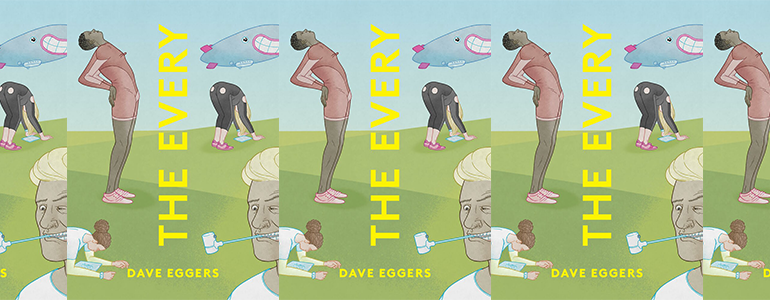What Is Social Media Doing to Us?

In 2013, Dave Eggers dystopian novel, The Circle, confronted readers with his fictional tech monopoly of the same name and told the journey of a young woman brainwashed by the company’s ideas and philosophies. In Eggers’ 2021 sequel, The Every, it appears the whole world has been brainwashed in the same way. The Every takes place ten years from the end of the first book, a period during which Mae Holland, The Circle’s naïve protagonist, has taken over as CEO of the company, and the concepts of “secrets are lies, sharing is caring, privacy is theft” have become common place across the globe. Eerily mimicking Facebook Inc.’s recent rebranding as Meta—announced the same month as The Every’s publication—the Circle has also now become “the Every.”
It is no coincidence that Eggers’ fictional corporation reflects Meta so well, as the Circle, too, began as a social media site driven by engagement figures and ad revenue. These origins, in Eggers’ sequel, prove to be catastrophic for the behaviors and values that people begin to adopt due to the company’s success, which brings current social media behaviors into the real-world social sphere.
By the time The Every’s events occur, the company has monopolized worldwide internet usage, having absorbed the once-preferred online market referred to in the novel only as “the jungle”—Amazon—and bought dozens of start-ups to reduce competition, as we see happen to the protagonist, Delany’s, employers at the beginning of the novel. The company is not subtle about their belief that the Every’s technology and values ought to extend across the globe; they refer to their campuses as “Everywhere,” while anywhere outside is “Nowhere.” As such, the Every’s staff represent a very insular community, who reject outsiders and reproduce their own ideas in an echo chamber that is quite literally walled and guarded.
The idea of “echo chambers” is a common concern regarding online communities, which are often claimed to reflect a user’s own ideas back at them without critique. In his 2012 book, The Filter Bubble: What the Internet is Hiding From You, Eli Pariser claims that social media platforms trap users in “filter bubbles,” where their interests determine the content that they see. Pariser claims that this is due to the fact that “the owner gets paid more the louder the noise is,” as higher engagement— whether positive or negative—results in more ad revenue for the platform. As it benefits the site owners for people to see content they like and agree with, algorithms are tailored to a person’s existing preferences and opinions. Presumably, having begun as a social media site, the Circle, and now the Every, will have promoted the creation of filter bubbles and echo chambers to keep their users engaged.
In the Every, we see these echo chambers expand into the real world. The Every staff, working and often living on campus, never have to engage with those from the outside world who disagree with them. Even products they dislike, such as single-use plastic, are banned from the campus, removing the possibility that any staff member will be faced with anything they object to. The campus is constructed so that no one has to leave—all of their needs and wants are satisfied—meaning they are incentivized to remain in their real-world echo chamber, never having to face the outside world. We see this come to a head when Delany arranges for a group of Everyones to go to the shore to observe a colony of elephant seals. While Delany sees this as a wonderful experience, her colleagues are horrified; they are traumatized by the experience, unable to cope with anything outside their familiar campus life. The staff appear, through their dedication to the insular community on campus, to have regressed to children, needing guidance on what to bring on the trip and requiring a hearing afterward to process their distress. The Everyones now see anything outside their in-group as not only displeasing, but traumatizing. As such, insular online communities have manifested insular communities in reality as well.
The influence of algorithmic filtering on social media engagement is also said to increase radicalization online. In response to the January 6 insurrection, Congresswoman Anna G. Eshoo claimed that “the algorithmic amplification and recommendation systems that platforms employ spread content that’s evocative over what’s true,” causing misinformation and paranoia to escalate. In 2017, the chair of the UK Home Affairs Committee, Yvette Cooper, accused social media sites of grooming and radicalizing users, as “once people go on one slightly dodgy thing, [the sites] are linking them to an awful lot of other similar things.” Yet again, this trend is driven by algorithms programmed to improve user engagement and thus ad revenue, rather than to filter out negative, hateful, or incorrect information.
This radicalization appears in Eggers’ novels as well. The entirety of The Circle follows Mae as she is groomed and radicalized, though this process takes a long time, beginning with the introduction of simple, widely accepted ideas—“sharing is caring”—and progressing slowly to more radical ideas—“privacy is theft.” By the time The Every rolls around, however, this radicalization occurs much more rapidly, and appears to happen without much intervention being needed. For example, after Delany’s trip to see the elephant seals, concern for animal welfare quickly snowballs into a complete ban on pets, beginning on campus and soon, due to the Every’s far-reaching influence, expanding across the country. As a result, Delany’s friend, Wes, has to give up his dog. Similarly, the death of Eamon Bailey sparks a renewed interest in the development of his technologies, which intend to allow people to experience the world without leaving their homes. The environmental effects of this technology, such as reduced air travel for holidays, cause Everyones to endeavor to reduce unnecessary travel, but this fair concern quickly develops into agoraphobia, with many seeing trips off campus as suspicious or risky. The Everyones demonstrate a kind of self-radicalization, in which the influence of the aforementioned insular campus community causes a quick, dramatic escalation from rational concerns to fearful paranoia.
Finally, the Every reflects communication behaviors that proliferate on social media, in particular the tendency for quick, unfocused communication rather than full conversations. These behaviors are demonstrated best by Kiki, who Delany meets on her first day at the Every and who guides her through her trial run in each department. During every meeting with Kiki, we see her break her conversation with Delany to attend to her son, who she has constant contact with through her phone. Kiki regularly stops mid-sentence to respond to her son and his teachers, or to fulfill her water, exercise, and laughing requirements for the day, as dictated by reminders on her phone. She is never able to finish a conversation with Delany without looking away. By the end of the novel, Delany finds her in a hospital, recovering from stress, much like Mae’s friend Annie in the first book, whose overworking puts her in a coma. Even then, Kiki asserts that she just needs to be more organized, and that increased usage of algorithms to structure her day will reduce her stress. The absence and complete lack of mention of Annie in The Every suggests dire consequences for Kiki if she continues in this manner, and it is troubling to think what kind of communication skills her son will develop having had constant access to his mother throughout schooling, without the ability to hold a full conversation without being distracted.
Eggers’ novel, through a demonstration of the real-life consequences of the proliferation of social media behaviors, paints a dire picture of the future, in which concern quickly becomes panic, and uninterrupted conversations are rare. In projecting social media trends onto real life, Eggers makes these behaviors, which seem normal online, unfamiliar, causing readers to question how healthy they are. As with many dystopias, witnessing this undesirable future is intended to make us question our current reality and imagine where our present behaviors and norms may lead.



